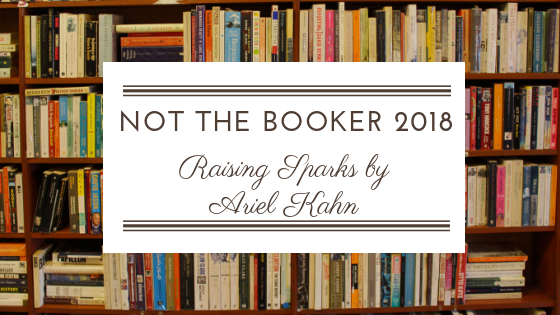|
Whereas Sealed opened with a marvellously unsettling oomph that propelled me straight into anxiety-central, Raising Sparks opens with poise and the sense of a breath held. It was every bit as effective. Rather than propelling me into the story, Raising Sparks lulled me instead, coaxing me in through the ubiquitous imagery of light interwoven through the opening chapter, ending with the light of the setting sun leaving Malka’s fingers stained like blood.
Ariel Kahn establishes a wonderful sense of place right from the start with Malka’s outing into Jerusalem: to the Christian quarter, an area forbidden by her father, and to the coffee merchant who teaches her Arabic phrases. Kahn creates a city which embodies the dichotomy of the overlapping and the separation of different cultures and religions in one place. It feels inevitable that this will be a place of conflict and transgression, of various sorts. And so it proves to be. The imagery of light (which continues throughout the book) and the author’s descriptive talents elevate the prose to something beyond the usual. The author’s touch can be poetic, often lyrical, and sometimes reminded me of the writings of Kahlil Gibran. Some of the chapter titles also brought Gibran to mind. Hopefully, anyone who has read Gibran will agree that this is a very good thing indeed! In spite of this, the overall effect of the prose remains accessible and light. The lyrical sits alongside the modern and colloquial, and somehow the mix works. This is a novel to savour, not to whip through. It is imbued with ideas (and ideology), with thoughts, with challenges, with dreams; they are draped over Kahn’s words, hanging there waiting to be pulled down and mulled over by the reader. I read several chapters twice; I just couldn’t move on until I felt I’d had the full benefit of what was on offer. It’s rare that I feel like that about a book. Kahn explores some wonderful existential ideas in a way that, I believe, could appeal to readers of all faiths and none. The concept of silence as a quality essential to the well-being of the human race and the planet on which it dwells is central. The silence is not silence as we might think of it; it speaks, it has a message. Chashmal: the speaking silence. If you listen carefully enough, you might hear God’s words still sighing through creation, like the wind in the trees. If you can find that language in yourself, you can use it ‘to help remake the world, heal what is broken.’ Whether you interpret the presence in the silence as the word of God or whether you view it in a wider sense, few of us could argue with the fact that the human race and its cradle Mother Earth might be in a far better position if we stopped to listen more often. Other ideas about the fulfilment of humanity abound. One that struck me particularly was the idea that if we ‘fully inhabit our own broken-ness, we can find the sparks of light hidden there.’ This struck me as a very Jungian idea, the embracing of the archetype of the Shadow which lurks in all of us and without which we cannot progress to individuation, the completion of the psychic whole. I knew little about Kabbalah, I’m ashamed to say. But most of the terms that were unfamiliar to me were gently explained in the book, close to their first use and in such a way that the flow was never interrupted. So although I felt as though I’d entered a world I knew little about, it drew me in without any difficulty. This is a textured book, with many layers. I strongly suspect I have only scratched the surface. There are references to Blake, one of my favourite poets and, as a visionary and mystic, so fittingly included here; there’s material that brings to mind Freud (and I have already mentioned Jung above); there are some beautiful quotes from Russian poet Anna Akhmatova (whose work I confess I did not know). There are wise words about identity, fate, judgment and a whole host of other pertinent questions. And neither is the tension between Israel and Palestine ignored or glossed over. In fact, although it is not mentioned directly more than a handful of times, the question carries one of the strongest messages of the novel which, to pinch the author’s own words, showcases the possibility, the necessity, of a shared future. And we’re not just talking about the Middle East there. I feel most passionately about those books that have something to say to me. Books which speak to us directly in some way are often the most powerful, I think. But this book didn’t just speak to me – it sang to me, from the very first page to the very last. I think it is one of the most engaging, poetic and mesmerising novels I have ever read. And if all of the above hadn’t made me fall for this book, there’s more. Some very gentle humour runs throughout, never jarring but always welcome. There’s a recipe on page 185 which sounds delicious. And anyway, who can resist a book that includes the sadly underused word ‘curlicues’? I rest my case.
1 Comment
23/10/2019 12:15:49 am
I appreciate the author for collecting this information and writing it into and an amazing article. I have understood the topic and the words you want to explain in your article. According to my experience, you will gain success because of your writing skills.
Reply
Leave a Reply. |
Nikki Brice
Proprietor of editorial business Splendid Stories. Experienced, professional editor offering creative guidance, developmental editing/critiquing, copy-editing, and proofreading. |

 RSS Feed
RSS Feed